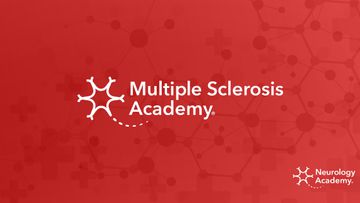Innovations in symptomatic and rehabilitative therapy
Event reportsThe panel reviewed lifestyle, non-medical interventions and pharmacological interventions for fatigue and cognitive impairment in MS.
Tiffany Braley outlined 'Rehabilitative and Pharmacological Therapies for MS Fatigue', examining current trends and gaps in knowledge.
She highlighted the wealth of evidence for cognitive behavioural therapy and exercise as first-line treatments for MS fatigue.
Key references:
Andreasen AK, Stenager E, Dalgas U, 'The effect of exercise therapy on fatigue in multiple sclerosis', Journal of Multiple Sclerosis, April 5, 2011 doi.org/10.1177/1352458511401120
White, L.J., Dressendorfer, R.H. Exercise and Multiple Sclerosis. Sports Med 34, 1077–1100 (2004). doi.org/10.2165/00007256-200434150-00005
Kessel K, Moss-Morris R, Willoughby E, Chalder T, Johnson MH, Robinson E. A randomized controlled trial of cognitive behavior therapy for multiple sclerosis fatigue. Psychosomatic Medicine. 2008;70:205–213. doi: 10.1097/PSY.0b013e3181643065.
Pharmacological treatments have not had the same efficacy as either CBT or exercise.
For both the following there has been mixed reviews in efficacy (Pucci et al, 2007)
- Amantadine has demonstrated modest efficacy for fatigue
- Modafinil is often used where Amantadine is ineffective
- Methylphenidate is unproven in treating MS fatigue as yet
She mentioned the TRIUMPHANT-MS study (Nourbakhsh, 2020) which Bardia Nourbakhsh, the principal investigator, went into more detail on after her presentation ended.
Key references:
Pucci E, Branãs P, D’Amico R, Giuliani G, Solari A, Taus Cet al, 'Amantadine for fatigue in multiple sclerosis (Review)' The Cochrane Collaboration 2007; reprinted in The Cochrane Library 2008 Issue 4
Nourbakhsh B, Revirajan N, Waubant E. Treatment of fatigue with methylphenidate, modafinil and amantadine in multiple sclerosis (TRIUMPHANT-MS): Study design for a pragmatic, randomized, double-blind, crossover clinical trial. Contemp Clin Trials. 2018;64:67-76. doi:10.1016/j.cct.2017.11.005
Tiffany suggested that fatigue is multifactorial yet often we have studied it in a silo. She questioned why we are not considering more of a multifactorial approach.
She demonstrated what this might look like, outlining a trial she has begun to offer patients telephone-based cognitive behavioural therapy, modafinil or a combination of the two, and monitor the outcomes. The trial:
- uses the Modified Fatigue Impact Scale to measure fatigue
- has been entirely virtually based and able to continue during COVID-19
- is looking at MS type, sleep (sleep hygiene, day-time sleepiness and sleep disorders), and depression as factors at play in this work.
Bardia Nourbakhsh outlined a 'Randomized Trial of Amantadine, Modafinil and, Methylphenidate for Multiple Sclerosis Fatigue', known as TRIUMPHANT-MS.
The trial was focussed on understanding whether pharmacological approaches can be successful in treating MS fatigue.
Fatigue is the most common symptom of MS, for many it is considered their most severe symptom, and it differs from tiredness or excessive daytime sleepiness.
- CBT and exercise have both found efficacy in treating MS fatigue.
- Medication is also commonly used to treat fatigue, but as Tiffany highlighted earlier, there are not consistent findings as to whether they are effective.
The TRIUMPHANT-MS trial is a pragmatic, randomised, double-blind, placebo-controlled, crossover, two-centre trial.
- Evaluate the safety and efficacy of the three medicines
- Modified fatigue impact scale measured during the 5th week of each treatment period
- 141 patients went through to the randomised trial
- There was no statistically significance between any of the three medications and the placebo across any of the three score systems.
- Patients who had a high daytime sleepiness score at baseline did have an improved fatigue score overall when taking modafinil or methylphenidate as opposed to placebo.
Score systems used in the TRIUMPHANT-MS study
Key reference:
Nourbakhsh B, Revirajan N, Waubant E. Treatment of fatigue with methylphenidate, modafinil and amantadine in multiple sclerosis (TRIUMPHANT-MS): Study design for a pragmatic, randomized, double-blind, crossover clinical trial. Contemp Clin Trials. 2018;64:67-76. doi:10.1016/j.cct.2017.11.005
Daniela outlined a small study conducted with 14 people with MS using 10 neurofeedback sessions to address cognitive impairment.
- 7 successfully completed training and showed improvements to their cognition after training.
- There was no difference in sample between those who were successful and those who were non-responders.
- Neuroimaging was used to monitor patients in the study.
Findings of the study included that successful SMR neurofeedback training leads to:
- cognitive improvement,
- increased white matter integrity
- functional connectivity in brain regions associated with self-regulation, motor and cognitive function.
Daniela concluded that:
- Neurofeedback could be a promising approach to cognitive rehabilitation on people with MS and it deserves further exploration
- Multi-modal advanced MRI should be integrated to investigate structural and functional correlates of treatment effects.
Key reference:
Kober SE, Pinter D, Enzinger C, et al. Self-regulation of brain activity and its effect on cognitive function in patients with multiple sclerosis - First insights from an interventional study using neurofeedback. Clin Neurophysiol. 2019;130(11):2124-2131. doi:10.1016/j.clinph.2019.08.025
Related articles

The MS Prodrome by Dr Helen Tremlett
Encouraging excellence, developing leaders, inspiring change
MS Academy was established in 2016 and in that time has accomplished a huge amount with exciting feedback demonstrating delegates feel inspired and energised along their personal and service development journeys. The various different levels of specialist MS training we offer are dedicated to case-based learning and practical application of cutting edge research.

